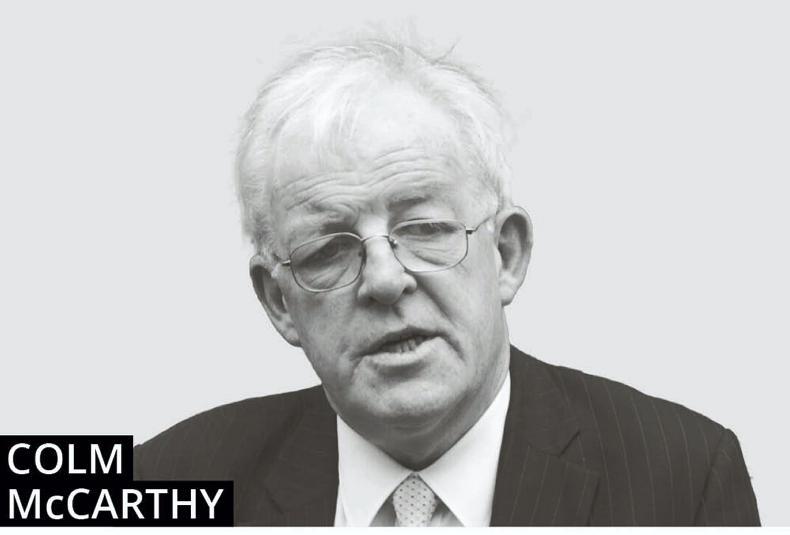Traffic in Dublin city centre was disrupted on Monday by truckers protesting about fuel prices. Irish farmers have taken to the streets too, worried about the costs they will face in adjusting to the needs of climate action.
The next few months will see details released of the Government’s climate measures across the different sectors and there will be more disquiet as the public learn about the extent of the changes that will be required.
Failure to commence emissions reduction in good time, which would have been in the 1990s at the time of the Kyoto agreement, has meant that the cost of adjustment will be higher and the scale of the extra cost has yet to sink in.
The extra cost arises mainly from the accumulation of stranded assets in recent decades, assets which rely excessively on the combustion of fossil fuels.
Coal stations are still being built, outside Europe and North America, which could produce for another 40 years or more
The world now has too many coal-fired power stations, too many road vehicles and space-heating systems that use fossil fuels. They will have to be replaced before their useful lives are done.
Coal stations are still being built, outside Europe and North America, which could produce for another 40 years or more and they are threatened with premature retirement. Look what happened to the turf stations built in the early 2000s in the Irish midlands.
Space-heating systems in homes, shops and offices have long lives too and retrofits are costly. Replacing a large slice of the nation’s capital stock, including most of the power generation and distribution system, can only be an economic burden. So are the changes needed in farming, the replacement of large parts of the transport fleet and the insulation of buildings.
Irish people are positive about the economic and quality of life benefits that can be achieved through a climate change response
A national sample of 4,000 people was interviewed by Behaviour and Attitudes on behalf of the Environmental Protection Agency (EPA) and the results were released last week. The report is called Climate Change in the Irish Mind and the official summary is upbeat.
“Irish people are positive about the economic and quality of life benefits that can be achieved through a climate change response. About six in 10 Irish people think climate action will improve economic growth and create jobs, and 78% of people in Ireland say taking action to reduce climate change will improve Ireland’s quality of life.” Some of the responses are positively myopic.
The history of international climate policy these last 30 years has been about action deferred and additional cost needlessly imposed. If the Irish public expects the accelerated measures that must now be faced to enhance economic growth, they are likely to be disappointed. How is it good news to discover that you have been accumulating stranded assets for decades and must fix your home heating system, change your car and face higher energy bills as the mistakes get rectified?
It may well turn out that “quality of life” will improve if people opt for better diets or more exercise, and there will certainly be jobs created in retrofitting, but there will be an interruption to economic growth as traditionally understood.
If resources must be redirected to asset replacement, they will not be available to produce consumer goods and to enhance living standards. If people in Ireland expect the climate adjustment to be painless, there will be political trouble as reality intrudes.
Politicians, in seeking public buy-in to climate action, have been sugaring the pill and may already have misled the public into unrealistic expectations of a costless transition
There has been a steep increase in energy prices this year, due in large part to geopolitical factors and COVID-19 problems with supply. But some of it is due to deliberate policy, including a further increase in the carbon tax.
There will be more of the same, along with restrictions on the use of solid fuels. Politicians, in seeking public buy-in to climate action, have been sugaring the pill and may already have misled the public into unrealistic expectations of a costless transition.
Carbon taxes around western Europe are rising and the Irish truckers are not the first to react to rising automotive fuel costs.
A higher carbon tax is a climate policy sufficient unto itself, regardless of the destination of the revenues
Remember the 2018 Gilets Jaunes protests in France, which forced the Government to abandon a modest increase in the fuel duty rate? The EPA report concludes that “most people support spending carbon tax revenues on programmes to reduce carbon emissions and to prepare for climate change impacts”.
A higher carbon tax is a climate policy sufficient unto itself, regardless of the destination of the revenues.
Higher taxes cut consumption, as will excise duties on jet and marine fuels, also on the European Commission agenda.
The EPA report found widespread support for climate action and the agency seems to find this reassuring. But public support is based at least in part on happy talk, a perception that the neglect of climate action in recent decades has been costless.
The public interest would be better served if governments admitted this is not so, seeking instead the least costly options.






 This is a subscriber-only article
This is a subscriber-only article










SHARING OPTIONS: